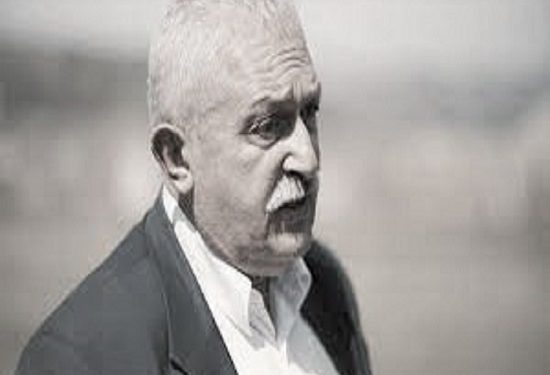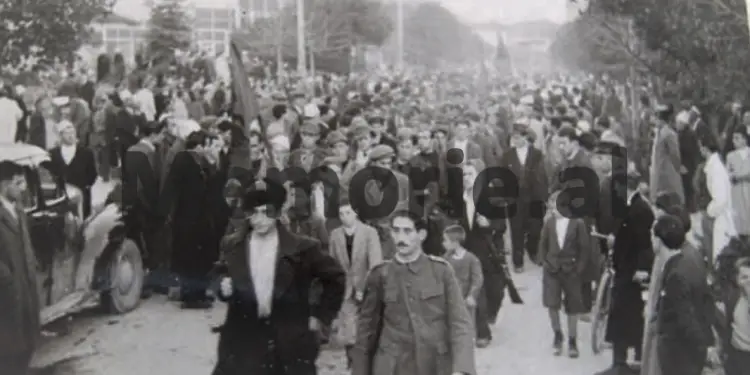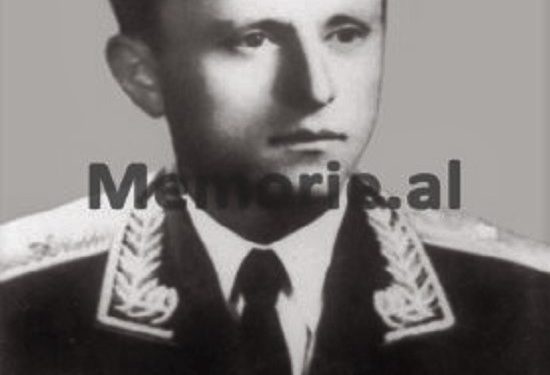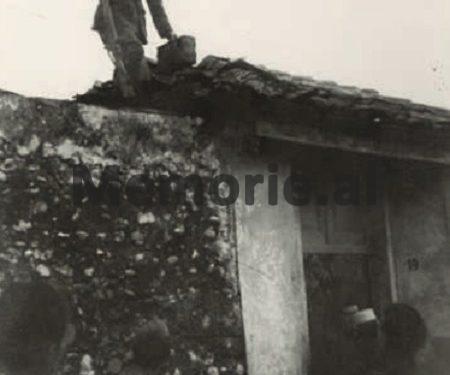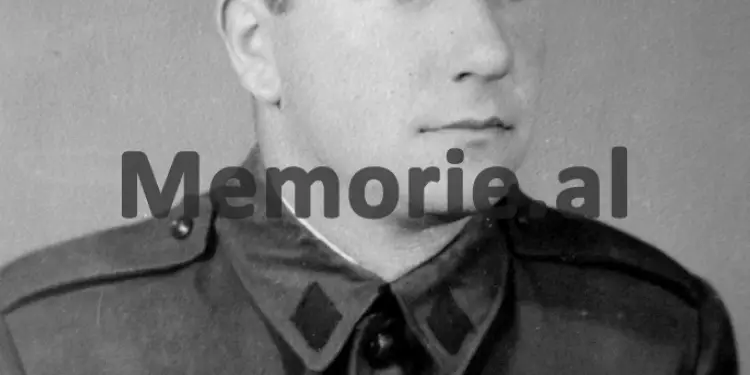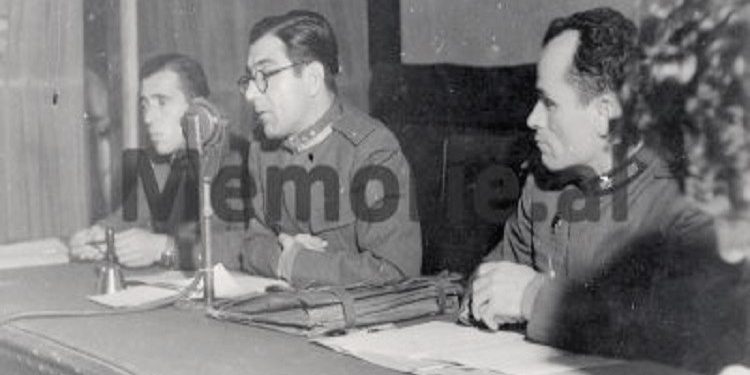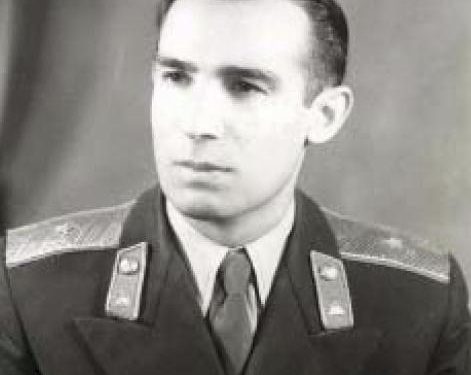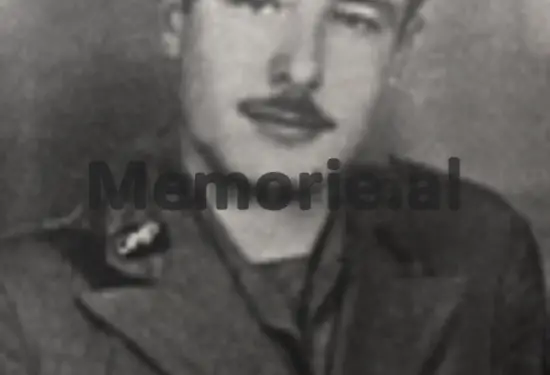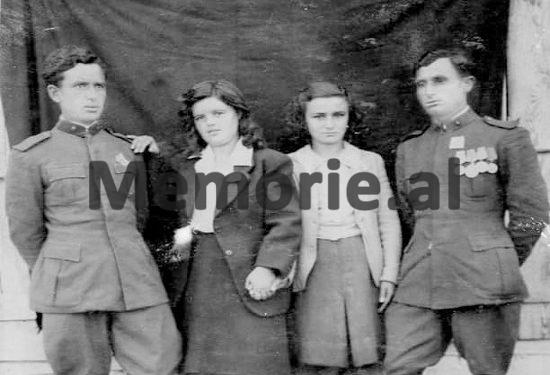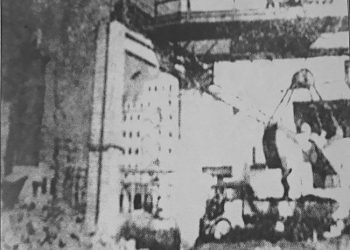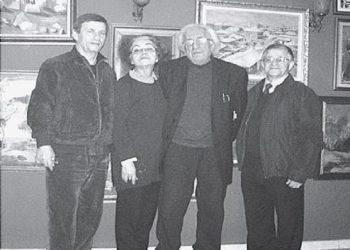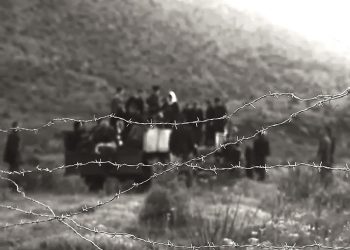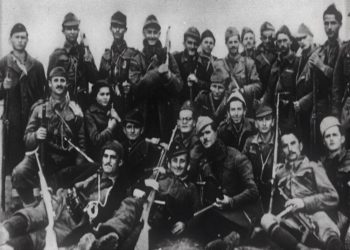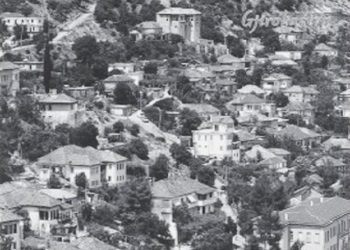By Marcel Hila
The first part
“SHKODRA DURING THE ESTABLISHMENT OF THE COMMUNIST DICTATORSHIP, 1945-1953″
Memorie.al / from the beginning of this article, I wanted to emphasize that we must take for granted the fact that: those who came to Shkodër on November 29, 1944, were military troops who were behind the invading armies, to expel them from this country. As the liberation is accomplished, the military force, as soon as it completes its mission, as is usually the case everywhere, must be demobilized and its men sent to their homes. But this did not happen to us.
Exactly this measure, so-called liberation, as soon as the invading enemy crossed the border of the country’s territory, like a flood of dirty and muddy water, violently attacked the life and people of this area. As in the television chronicles, when we see torrents of water attacking the cities, penetrating the houses, covering the shops, destroying the workplaces, blocking the traffic, ruining the furniture, while in the villages they drown the animals and cattle, flood the houses, take away the fertility and food…!
This is how it happened from the beginning: a flood that came with mud and scum, from those who declared themselves liberators, but who turned out to be hordes from the darkest recesses of the South, human arrivals filled with hatred and ideological poison. These massacres and this terror were not done even by the invaders in the five years of the Second World War, even though they were occupiers. The sons of the Albanian people did it. These so-called “liberators”, who were burning for freedom, cease to be so within a day, and in an instant, they turn into executioners and criminals.
Here are some of the criminals who massacred Shkodra…!
So, who are these hordes that have poured into the streets and squares? Of course, they are tools that the communist leadership was using while establishing the dictatorship in Shkodër and the surrounding area. A part of them leaves for Yugoslavia, to help install the communist dictatorship in Kosovo, as well as to hand over nationalist opponents to Tito’s forces. But let’s go back to our country, and more precisely, to our Shkodra.
I very much agree that a study of the arguments mentioned here is necessary, but not to be satisfied with these alone. I recommend that the focus be extended to other aspects that show that when the “New World” was being installed, human massacres, injustice, robbery, violence, and unique cruelty were manifested step by step. This is what the events suggest. Let’s see their chronology.
From the first day, they violently took the state institutions, the prefecture, the municipality, the bank, the military departments, but they also devoured many houses, because the most important communist-military leaders, who came from the mountains, would enter them. Koka’s house is taken over and becomes the military command of the north, in the most important office of which Tuk Jakova has taken a seat. Later, this building will become the district and district Party Committee.
Let’s not forget the houses of Shkodra families that were filled with police officers brought from the south, first for the People’s Protection Section, and then for the Internal Affairs Branch! A misery in itself! How many injustices, how many perversities have been committed. How many were those families that were forced to either leave or shrink, to make room for their executioners. When I was a child, at the threshold of the Dabërdaks’ house, I saw old women with black scarves on their heads, sitting by the door and staring at the world.
They had come with their sons, who now worked as prison guards, from the Deep South. In the Assembly of Friars, which was taken over and became a house, a fearful scum of people had gathered. I remember when I was a child, since my house was nearby, the policeman Visho, from the villages of Vlora, an immoral pervert. Who knows how much you know about them! Invasion of citizen’s houses by southern-communist scum! With numbers, the appearance is frightening, with monstrous human qualities!
Just because Monsignor Gaspë Thaçi did not ambush Mehmet Shehu, he ordered…!
How many arguments will come out like this, if we look carefully at the pain and injustice in all its manifestation!! What about taking houses in the early days? They took the newly built house of the merchant Lec Shkreli, which is in Piaça, where Muho Asllani lived until the end! How did they get the Archbishop? Mehmet Shehu went to visit Mr. Gasper Thaçi for Easter, on April 1, 1945, a week after Don Ndre Zadeja had been shot. The monk, after this murder, had fallen into bed, sick of his heart. He didn’t wait.
Then, in revenge for the fact that the Archbishop did not get what he expected, Major General Mehmet Shehu ordered that the four-story building be taken. It was filled with security officers from the south. But where did Shefqet Peçi, the commander of the district military troops, prosecutor Josif Pashko, prosecutor Aranit Çela, and other criminal prosecutors and other high-ranking military officers live? If we ask, they tell us. Undoubtedly, there must have been great pain and injustice, because it is about expropriation and expulsion.
Zoi Themeli, the first chairman of the People’s Protection Section for Shkodra, takes up residence in Alimëhillet, in front of today’s Ambulance. Nesti Kopali, the vice president of the People’s Protection Section, to the family of Karlo Çoba, in Gjujadol, to the beautiful and magnificent house, on the second floor. Do we have a map of these devourings, in the best sense of the word? No, I’m sure, but we have to! And the heads of the Department of Internal Affairs, who were they? Real monsters! Zoi Themeli, an incomparable criminal, a hardened ignoramus, who had worked in a bakery in Korça: he had only four grades at school. Gjovalin Zezaj, a member of the “Bashkimi Albanian” group, arrested in this circumstance, says that: Zoi brought Mark Çun to confront me.
Since Mark didn’t accept anything, in my presence, I beat him with a German whip. The whip was brought to his throat, drawing blood every time it fell on the soft flesh of his neck, while, after beating him thus, he threw him to the ground, kicked him and broke his arm. Martyr Mark screamed in excruciating pain, but Zoe kept shooting him. When he got tired, he called the policeman to take him and take him to the cell, downstairs. He told him to drag him. He picked her up by pulling her by the legs. He took him down the stairs of the Section building, from the second floor to the first, and his head fell on the stairs, all concrete, causing him excruciating pain.”
Or the chief criminal and rapist Nesti Kopali?!
It is enough to read the pages of Father Zef Pllumi’s book, to remember how much he massacred his victims with the tip of his polished boot, the sadistic officer from the village of Qorraj, Fterrë municipality, Saranda area. He was the vice president of the Section. He took young girls to the office and pressured them because they were allegedly part of opposing organizations, and he was going to arrest them, but he raped them there. And he didn’t even let them raise their voice and oppose. What about the terrible Lilo Zeneli, whom Ahmet Bushati tells how he massacred with incredible ruthlessness?! He had put her under the table and kicked her.
Even Kolec Pikolini talks about a terrible beating he had given him in 1948, when he was arrested. He was a butcher by profession. He didn’t even have two grades of school, but he was the party’s confidant. Followed by the criminal Rasim Dedja, also uneducated and finally the monstrous Hilmi Seiti, a drunkard, gambler and immoral, his love stories are still told today in Shkodër. He was the one who led the martyr Marie Tuci to death, simply because the girl who had entered his path to become a nun, refused to become his girlfriend. In revenge, he caused his death. He succeeded in mobilizing the entire machinery of the dictatorship.
Frederik Nosi, the president of the Supreme Court, two days before the martyr died in the hospital, read her prison sentence, on the charge that she harbored saboteurs. This, together with the masked investigator Ali Dhunga, have fabricated monstrous accusations against the shot priest Dom Ejëll Kovaçi. But where are these criminal types full of vices? Understandable: occupy the best houses! And who do they take from? These must be discovered! Do we know anything about these “Robeispiers of the Albanian revolution”? No! Very little. They were said to be demons.
In the archive of the former State Security, there are the files of every former officer and former prosecutor of the Military District of the beginning period, because it was a requirement to give an account through autobiographies.
Aranit Çela wrote with his own hand that he was the son of a drunkard who…!
In those files, in the autobiography written by his own hand, Aranit Çela tells that he had a drunkard father (sarahosh, as he writes), who had mistreated his wife and children and who died drunk on the highway. (The autobiography was compiled accurately, because in cases where the truth was not told, the person suffered). After the death of her husband, the mother goes to ask for help from Dom Mark Papaj, the Catholic priest of Vlora, and tells him that she is a widow with many children and needs help. He, sensitive, allegedly rents a jerevi, enough to justify the expenses, but in the village of Araniti, he never set foot.
It was a pretext to help the poor woman postpone her life. This is also written in his autobiography. As soon as the twenty-two-year-old Araniti, after abandoning fascism and becoming a communist, was brought to Shkodër, he demanded endless death sentences for almost all the Catholic clergy, one of whom was the one who had helped him increase his stature with bread. But Dul Rrjolli, who had once been good, because he had studied at the Madrasa, but then, because of his bad friends, he had become a thief, a drunkard, and had taken up with the whores of Kotor. He writes this himself in his autobiography.
It shows that he had made serious mistakes in his youth, as a gambler and a vagabond, but he does not forget to note that the Party had rehabilitated him and given him a very important task: that of eliminating the opponents of the new government. What about Ali Dhunga, what about Siri Çarçani, and how many terrible prosecutors and investigators? How many are there? Ready everyone. They come from dark wombs and take positions of importance that they have never imagined. It is worthwhile for all these “Marats” and “Dantons” of Albanian communism to be studied, even generalizing. It turns out that those who had the lives of the most valuable people in their hands, were the dirtiest scum of this earth.
Violent events tell us that the liberators, the day after the entry, intensively start house-to-house checks, in search of the people they have planned for prison and bullets. The lists are made! By whom? From those all the way up, but of course, with the help of the local communists! Checks are carried out on ceilings, in jerevis, in wells, in yards, in cribs, for fugitives, for former members of ‘Balli’ and ‘Legality’, for collaborators, for quislings, for weapons, checks with the consequence of terrorizing the inhabitants . It is checked on the relatives of the wanted persons, on the sisters and brothers, on the cousins. All these are found in the memoirs.
There are pages with a chilling truth, how these controls were carried out and the terror that was exercised on people and entire families. What about the mass foreclosures, which economically ruined the entire rich class? In order to please the Yugoslav communists, at the initiative of the local hierarchs, it was decided to seize the goods of the rich from Shkodra. Entire warehouses were emptied and trucks coming from sister Yugoslavia, filled up and headed there, impoverishing the local market to the extreme and ruining the owners. Great Ulcinac is a model example! What about the others? How many are these? Who are? How many things were taken from them by force? Is there a damage figure? Damaged families can tell a lot!
Thefts and robberies are committed. There is enough literature on this that, if studied, episodes of eye-to-eye theft clearly emerge. Father Zef Pllumi shows in his book how, from the checks carried out in the first days by the partisan teams, items of great historical value from the Archaeological Museum were stolen, which forced Father Mati Prendushi to complain to Shefqet Peçi. Father Francesco della Rosa, in his diary, published in the book “A Papal Seminary in the Whirlwind of Communist Persecution”, talks about the numerous controls, up to seventeen, carried out from November 30, 1944, to January 16, 1945, in The house of the Jesuits, with the result of the robbery of personal belongings, even with the seizure of gasoline, which served as fuel for cooking and lighting.
When the Jesuit superior, Father Daniel Dajani, went to ask Archbishop Gaspër Thaçi for help, so that he would intervene using his authority, so that such destructive controls would end, the Archbishop, powerless, told him that two days ago we had the control the next, that they left us three hours outside in the cold and at night, shivering from the noise, and when we went inside, we found the whole house in shambles, and many stolen items. This was also confirmed by Father Danieli, who told him that after checks, personal items are always missing.
Ahmet Bushati, in his book “In the footsteps of a diary”, talks about the numerous checks that were carried out in the first days of the beginning and the robbery of personal belongings. It even tells about a pair of binoculars that a partisan took from the wall without any permission and took them with him. How many such cases are there? No end. What about seizing the houses and assets of persons who are enemies of the government? How many apartments were seized? We don’t have a figure.
Mr. Ahmet Bushati says that: in Truma e Dugajë te Reja, he saw lists posted on a stand with the names of people whose houses were taken and that after that they were living with their whole families in the South of the country, in exile. This, since the first days of the entry of the hordes into the city, since December 1944. All those who have left their memories of the beginning, talk about these terrible episodes. Gjon’s tower of Marka Gjon is confiscated and all the family members leave for Berat, in exile. Date 1 December 1944.
But I think that we should also mention the numerous roadblocks that were placed on the streets, curfews with long hours, lasting several months, preventing normal passage and making it impossible to walk at night. Even when they needed to go out to announce the deaths, they could not do so because it was strictly forbidden. Things that had never happened, but were being done by an army that considered itself to be of the people and liberating. And the list of wanted people who had to be arrested at all costs, starting with the Kazazi brothers, with Sulçe Beg, with Malik Bushat, with many clerics, all considered as “enemies of the people”.
If you compile this list, you will not be surprised by their large amount in number, but by the human quality they represent. In order to escape, many went to the mountains and lived in caves and peaks, to protect their heads. There are thousands of these. They will come with thousands of Pursuit Forces to look for them and many of them will be killed and die pierced by the bullets of the liberators, for the sole fault of not thinking as these killers think and dreaming of a different Albania than the one they have designed devils and for this they are wanted and are candidates to be shot.
One for everyone: Ndoc Jakova, the brother of the famous composer Prenk Jakova, dies on the mountain from the bullets of the Pursuit Forces, at the entrance of a cave where he was, at the hands of the German priest, missionary, Don Alfons Tracki, who also will be shot after a terrible investigation, in 1947.
We should not forget the orders to keep houses open, for the midday and midnight raids, without waiting or remembering, of the armed forces, who searched for people and terrorized the population.
Those who have written them in the books, show real miseries. What about the first people shot without trial, such as the eight people killed in front of the Shkodër Municipality, on January 26, 1945, simply to terrorize the population, because the army of the liberators went to commit massacres in the North, not being able to penetrate into the area he does not know and cannot pass easily, leaves him dead in the field. Then, to show her imaginary opponents that she does not allow them the joy of receiving the news that they have suffered defeat, they organize the arrest and shooting without trial of the poor innocents.
A terrible scene is given to us by Kolec Pikolini, in his book “The Regime of Hyenas”, but also by Ahmet Bushati, in the book “Traces of a Diary”. There are other writings about this event of this day. A warning genocide, which will continue with the massacres of Kelmendi and Vukli, with the murders for the Shkreli Uprising, with the genocide and harsh death sentences of the Postriba Uprising, and will culminate with the massacre of twenty-two innocents of the bomb the Soviet embassy, in February 1951, one of the victims will be Mr. Pjerin Guraziu, the father of the honorable Mr. Filip Guraziu. How many were shot after the Rrmaji Cemetery?
There is no figure! How many mountaineers were condemned to death, simply because someone who found themselves in the mountains, to provide a shelter, knocked on their door, asking for hospitality? It meant that the Pursuit Forces surround the apartments, arrest the newcomers and take the owners of the houses with them. They punish them by firing squad for the crime of harboring wanted persons. But they don’t know who they have sheltered. They accepted the knocker, whoever he was! This kind of accommodation is part of the thousand-year-old code of mountain law, made the norm of life in these areas: hospitality is offered to anyone who knocks on the door, even without knowing who it is, even if you don’t know who it is, gives him shelter.
Ahmet Bushati, talks about a large number of such victims, who went bound, on the streets of Shkodra, with handcuffs and chains, right behind the cemetery wall to be shot. Father Francesco della Rosa, in his diary, from the beginning of 1946, says that: according to what is being said, the number of those shot for fifteen months is about a thousand people. What about the seizure of gold, the imprisonment of merchants, their expropriation, the terrible torture of the investigators for handing over their property to the state. Such a robbery had never been seen before. Guilt, under any legislation of the globe, is the theft of property from the rightful owner by someone. While the world was turned upside down: it was a crime if you didn’t hand over your property. But how many merchants and rich people are massacred and die in torture?
Is there an exact figure for how many thousands and thousands of gold napoleons were seized? How much gold did Shkodra withdraw from its family banks? From a reliable source, I have learned that the Kakarriqi family did not have a safe, but a very large cellar, filled with gold, which was taken and it is not known how and where it ended up. Isn’t this alone worth a detailed investigation? How many others were robbed in this way? Once upon a time, years ago, I worked with a boy originally from the villages of Gjirokastra, who told me that his father was brought to Shkodër, only to deal with seizing gold from merchants, and then he stayed here. They trusted these guys to carry out this kind of task.
What about the arrests of those who were money changers, who had exchanged gold with foreign currency, when merchants were leaving for trade abroad? As these arrested merchants were shot for not revealing their wealth, then, with a demonic cunning, this solution was found: arresting and torturing the money changers to death, so that they would reveal from whom they had stolen their money. If they spoke, the merchants suffered. These facts would be confronted and for making a false statement, the gold owners would also be beheaded. How many of these money changers were arrested? How many were those who resisted to the last point in order not to take the wealth of merchants, their trusted friends? A lot. There is no feather that describes the heroism of this brave men./Memorie.al
The next issue follows




